1967 to 2022: Newark's Arc from Rebellion to Revitalization - Yet Poverty Endures
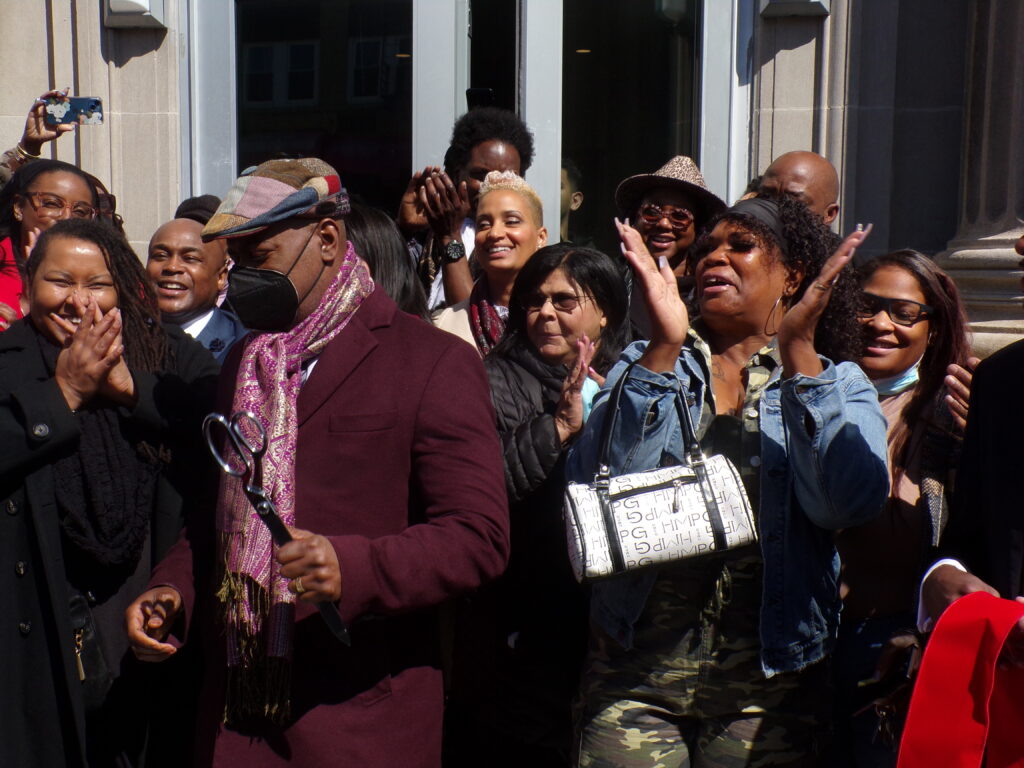
The Newark appearance this Saturday of the Rev. Dr. William Barber to promote his June 18 Poor People’s Campaign March on Washington also will be just ten days ahead of the city’s municipal run-off election June 14 that will determine the make-up of the City Council. The outcome of these races, in which Mayor Ras Baraka has much invested, could be seen as a reflection on how much progress the engaged electorate feels the incumbent has made on his ambitious agenda he laid out in 2014 when he was first elected Mayor.
Rev. Barber’s appearance comes 54 years after the Rev. Dr. Martin Luther made his last personal
[caption id="attachment_73592" align="alignright" width="300"]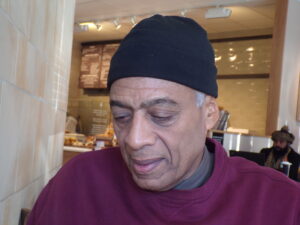 Hamm[/caption]
Hamm[/caption]
appearance in Newark on March 24, 1968. As the late Newark Library Historian Charles Cummings wrote, Dr. King visited the city’s Abyssinian Baptist Church and “gave his blessings to everyone who reached out to greet him and spoke of his next project, one that would take him South to undertake a Poor People’s Campaign. Although he felt compelled to preach to the emotionally charged crowd, time and tight schedule did not permit him to do so.”
Eleven days later, Dr. King was assassinated.
Ras Baraka would be born two years later. His father, the late Amiri Baraka, was an international and controversial literary figure who helped define the Black 1960’s radical movement in Newark and beyond. In his rise to power, Mayor Baraka has positioned himself as the authentic son of that radical tradition but also as pragmatic change agent who can help actualize the movement’s aspirations for social and economic equity.
Larry Hamm, a longtime Newark community activist experienced the 1960s and saw first hand the generational impact of the four days of civil unrest in July of 1967 that left 26 residents dead and swaths of the City a smoldering ruin. Amiri Baraka would short hand this bloody crucible as a “rebellion”, a term that Mayor Baraka also uses to describe the series of events that would haunt the City into the 21st century accelerating the flight of the white population to the suburbs.
PIVOT POINT
Rev. Barber’s visit and the run-off municipal election come more than two years into a once in a century mass death event that’s killed more than a million Americans and left millions more with long term potentially disabling effects from COVID. Multiple studies have shown that communities of color have like Newark suffered disproportionately during the pandemic as a consequence of pre-existing health conditions as well as long standing economic inequality which have become only more pronounced.
Mayor Baraka’s press office did not respond to email or a phone call seeking comment on Rev. Barber’s visit.
Like so many cities, Newark did not experience a real recovery from the Great Recession. And even though African Americans won the White House, many thousands, including residents of Newark, lost their homes, in a loss of household wealth of generational consequence.
Despite Newark’s long list of multi-million dollar economic development projects, increased police accountability, tens of thousands of Newark households continue to struggle economically. More than a half century after poverty was flagged by official investigations into the social conditions that lead up to civil unrest in July of 1967, it endures.
According to the United Way’s ALICE survey, which tracks households that struggle week to week to cover basics like childcare and rent, in at least three of Newark zip codes between 76 percent to 79 percent of families either fall below the federal government’s poverty level or are in that working poor status that’s forever falling behind.
In Newark overall, the poverty rate exceeds 25 percent as compared to New Jersey’s 10.7 percent. Incredibly, the age cohort with the highest rate of impoverishment are the city’s children under 6-years-old. Older children and teens don’t fare much better, something that Baraka administration has tried to address through increasing educational opportunities and community engagement.
But Newark’s efforts to uplift itself have to be put in the broader context of a corporatist national tax policy that actually encouraged and subsidized U.S. corporations to go transnational while spending trillions of dollars on military spending leaving the nation’s cities to fend for themselves as the their physical infrastructure crumbled.
On January 6, 2021, a violent angry mob, some with Confederate flags, stormed the nation’s Capitol at the instruction of President Donald Trump to “Stop the Steal” which was in actuality the legal memorialization of Joe Biden’s November election to the Presidency. In the months since, the Biden agenda which included raising the Federal minimum and uplifting the working poor which makes up so much of Newark’s population has been effectively stymied by Democratic Senators Joe Manchin (D-WV) and Kyrsten Sinema (D-AZ) and all of the Senate Republicans.
Currently, most analysts have predicted that with President Biden’s poll numbers, and his agenda stalled, Democrats will have a hard time retaining control of Congress.
“Rev. Barber has been an advocate for poor and low wealth people and poor and low wealth people compose a significant part of Newark’s population as they do for the population of almost every city in the United States and in rural America,” said Hamm. “I am glad he’s coming to Newark. I am glad he’s coming to New Jersey to advocate on behalf of poor and low wealth people whose ranks are growing in the United States, not decreasing and it has accelerated during the pandemic in the face of the greatest upward redistribution of wealth probably in the history of mankind.”
The entire rationale for Rev. Barber’s June 18 Washington March is to engage what he describes as the “sleeping giant of poor and low-income voters” across the country.
It was this under-appreciated voter cohort that provided the margin of victory in key places like Georgia where these voters sent Democrats Rev. Raphael Warnock and Jon Ossoff to the U.S. Senate. And while some beltway consultants try to coach Democrats away from progressive policies that appear “too left” or “too socialist”, they need to energize their base which includes speaking directly to the pressing needs of poor and low wage voters of all colors.
Out of the 168 million voters who cast a ballot in the 2020 general election 58 million were poor or low-income voters, according to research complied by Rev. Barber’s Poor People’s Campaign: A National Call for Moral Revival. “This means that more than one-third of the voting electorate—35 percent—were low-income voters,” according to the PPC: NCMR report. “There were another 22 million low-income voters who were registered, but did not vote, meaning that out of the 215 million registered voters in 2020, 80 million—or 37%—were eligible low-income voters.”
The report continues. “While low-income voters are not a monolithic group, they represent a significant population of voters that is often overlooked and misunderstood. This report focuses on low-income voters in 2020 and the broader population of eligible low-income voters as an electoral sleeping giant, holding the potential to shift our political maps and reshape our political priorities.”
According to PPC: NCMR’s state-by-state analysis of the 1.4 million registered low-income voters in New Jersey, just over one million voted, meaning that close to 400,000 sat out the 2020 election. So, while this cohort’s registration rate was close to 80 percent, only 58 percent felt sufficiently engaged to follow through and cast a ballot.
DIMINISHING RETURNS?
The history of Newark’s voter engagement is illustrative of what appears to be troubling trend of citizen disengagement even as national trends in both 2018 and 2020 portended greater voter engagement more broadly.
In 1970, Newark had become a Black majority city that was ruled ruthlessly by a white minority local
[caption id="attachment_51663" align="alignright" width="300"]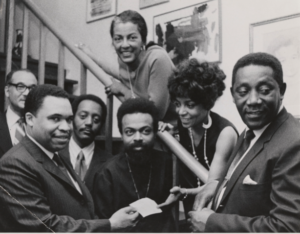 Mayor Gibson with Amiri Baraka in 1970.[/caption]
Mayor Gibson with Amiri Baraka in 1970.[/caption]
Democratic Party machine, with ties to organized crime. That year it elected reformer Ken Gibson, a city civil engineer, who with Amiri Baraka’s support became the first Black Mayor elected to a northeastern American city. In 1986 in his run for his fifth term he was defeated by City Councilman Sharpe James who himself would himself win five terms in office before his 2008 federal conviction for a criminal scheme involving the sale of nine pieces of city-owned properties.
In Gibson’s 1970 race against the incumbent Hugh Addonozio, who would be convicted on federal corruption charges, close to 100,000 voters turned out and Gibson won close to 55,000 votes. At that time, Newark had a population of 382, 417. By 2006, when Senator Cory Booker made his second run for Mayor he prevailed with just over 32,000 in an election that drew just 42,500 voters to the polls.
[caption id="attachment_117406" align="alignleft" width="300"]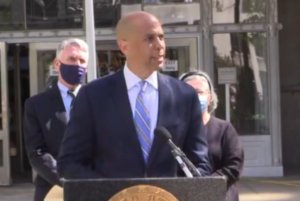 Booker[/caption]
Booker[/caption]
Today, it’s population is now on the up-swing at over 320,000, yet despite some signs of economic vitality, it’s home to people who appear to be, for a myriad of reasons, increasingly disinclined to vote, something that could cast a cloud over any ambition the current Mayor might have for statewide office.
In 2014, close to 45,000 voters went to the polls and Baraka won with just 24,358 votes. Scroll forward to this most recent election, and just 15,791 of Newark’s 165,000 registered voters turned out and 13,068 voted to give the
[caption id="attachment_132527" align="alignright" width="150"]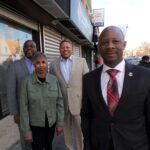 Team Baraka's Pat Council.[/caption]
Team Baraka's Pat Council.[/caption]
incumbent his third term. Boosters of the incumbent could say the lack of voter participation was a sign of general satisfaction with Newark’s direction. Critics could call it just another sign of voter disengagement and despair that comes after a steady stream of official corruption convictions. Some academics might point to the decline in local home ownership.
In the South Ward, Baraka ally Patrick Council had a commanding lead against challenger Terrence Banks-ton but still came up a few percentage points shy of the 50 percent threshold to avoid the runoff. In the East Ward, where Baraka’s pick did not make the run-off, there’s tighter contest between Michael Silva and Anthony Campos who were just dozens of votes apart.
[caption id="attachment_132550" align="alignnone" width="2560"]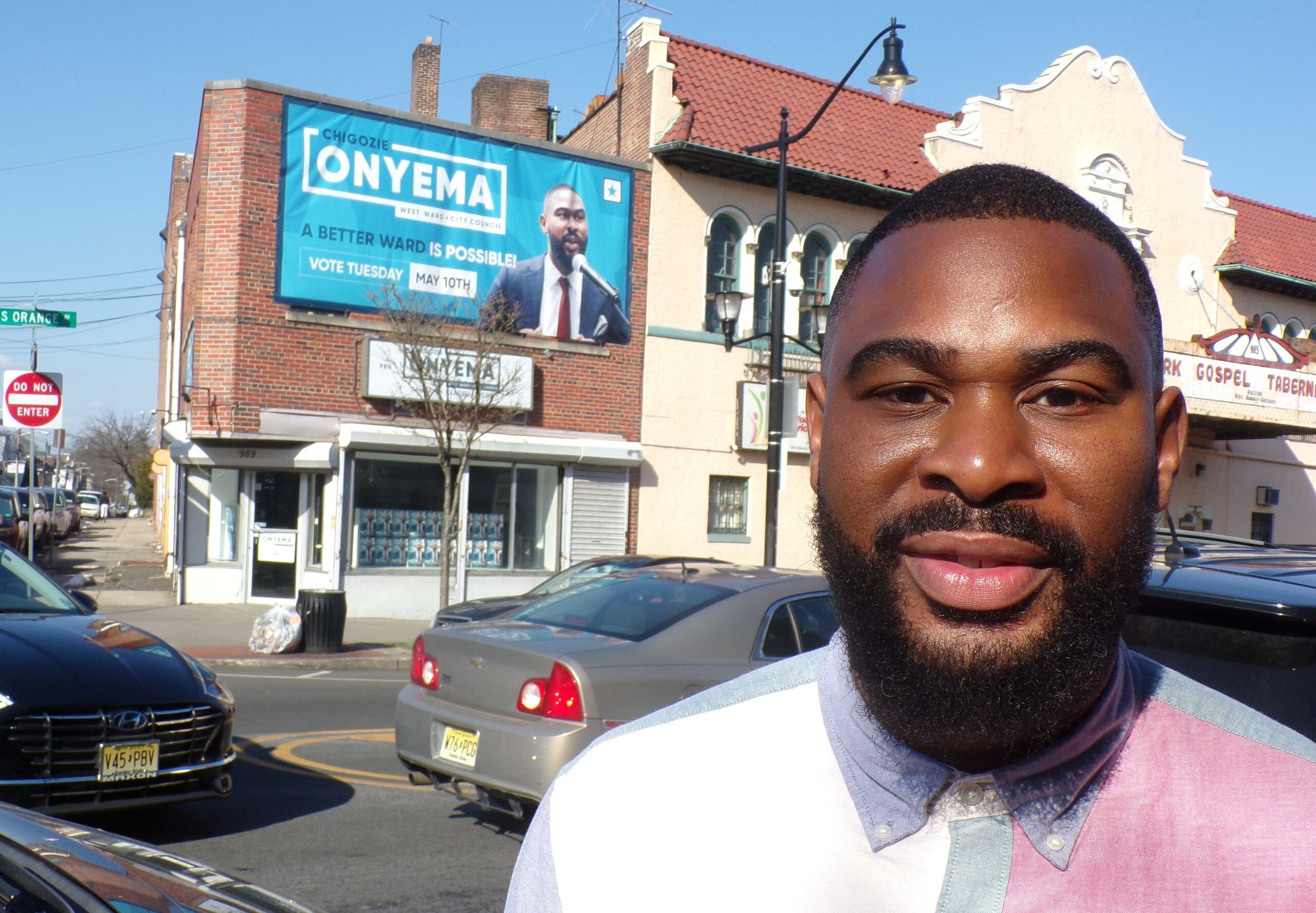 Chigozie Onyema[/caption]
Chigozie Onyema[/caption]
STRANGER DANGER?
In the also competitive West Ward a runoff was also required after Baraka backed candidate Dupre “DoItAll” Kelly, a renowned rap artist was just a couple of hundred votes ahead of Chigozie Onyema, a lawyer and former NJ Department of Community Affairs assistant commissioner. Oneyma has been backed by the Democratic Socialists of Northern New Jersey, who are aligned with Rep. Alexandria Ocasio-Cortez who has helped to elect candidates to local, state and federal offices across the country.
In that contest, Oneyma told InsiderNJ his opponent has put out a flyer and mailer alleging that Oneyma’s campaign is inspired by a group of “socialist extremists outsiders coming in.”
“They are also knocking on doors passing out copies of the literature and telling people that they need to stop the takeover because the socialists are coming to take over Newark,” Oneyma said. “This is the charge you heard against Dr. King. Anytime people with progressive politics do some organizing in a local community the first thing they try to pin on you is that outsider charge. It’s a form of red baiting that we have seen in elections all over the country.”
Attempts to reach Kelly by phone, text and social media for a response were not successful.
Hamm, whose spent the last half a century fighting in Newark for police accountability and economic justice, finds the latest twist and turns in the West Ward sadly ironic. Back in the 1960s he recalled that advocates for the status quo “called all of us Black radicals and communists. Who ever did this, it is disappointing and it really and it degrades the whole point of political debate—once you start engaging in red baiting.”
Mayor Baraka has embraced the “progressive” label for himself while at the same time pushing back on calls to abolish the police observing in 2020 on Hot 97 that while the community needed to hold police accountable, “racism, white supremacy and inequity” were not “born and raised in the police department” but were systemic throughout the broader society. Baraka added that Newark, under his leadership, had shifted resources from the police to social services and violence prevention strategies. He credited the shift in strategy with a dramatic drop in police discharging their weapons.
But in that same radio appearance he referenced the 2003 domestic violence murder of his sister Shani Baraka, 31 and said that he was wary of “bourgeoise liberal” policy ideas that failed to address “the issue [of violence] we face every day.”
‘MOST PROGRESSIVE’
According to his official bio, Baraka is “recognized nationally as a thought leader in the space of urban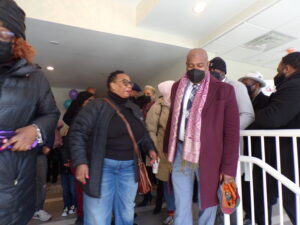 revitalization, and his commitment to reducing crime in Newark, reimagining public safety, tackling the city’s housing crisis, and developing innovative and community-driven approaches to eliminating income inequality has solidified his status as one of the country’s most progressive elected officials.”
revitalization, and his commitment to reducing crime in Newark, reimagining public safety, tackling the city’s housing crisis, and developing innovative and community-driven approaches to eliminating income inequality has solidified his status as one of the country’s most progressive elected officials.”
Baraka, a former high school principal has an impressive track record that includes an effective response to the city’s lead pipe drinking water crisis and his returning of local control of the public schools to the community.
“ I think the response by the City to the lead [pipe ] lining crisis is in line with trying to help those who were most impacted in our society,” Hamm said. “I think there are a number of initiatives the City could point to where they do in fact try to address issues that are a part of Rev. Barber’s agenda but here’s the rub—the thing most people don’t come to grips with or they fail for whatever reason to address—the forces that are driving the impoverishment and deprivation of the masses of people, that are driving ecological devastation, that are driving disparities in health care, and on and on, these are forces that are part and parcel of a system that really operates independently of municipalities. These are forces that municipalities really can’t control.”
In the aftermath of the 1967 Newark civil unrest Governor Hughes convened “The Governor’s Select Commission on Civil Disorder” that published what came to be known as the Lilley Report named after its chairman, then AT&T President Robert D. Lilley. The blue-ribbon panel of religious, political, and legal leaders were charged with generating “a realistic analysis of the disorders….and practical proposals” to help prevent a recurrence of the unrest.
Over months of investigation into the unrest itself, the panel took sworn testimony from more than 100 witnesses ranging from the Superintendent of the New Jersey State Police to Amiri Baraka, the poet and playwright, whose activism had made him a frequent target for the local police. The Commission also heard from John W. Smith, whose arrest was the flashpoint for events that would haunt Newark for decades.
After speaking with scores of Newark store owners and residents, the Commission concluded that members of both the police and the National Guard, motivated by racial prejudice, had used “excessive and unjustified force” on Newark residents, and had specifically targeted African-American-owned businesses for destruction. “These raids resulted in personal suffering to innocent small businessmen and property owners who have a stake in law and order and who had not participated in any unlawful act. It embittered the Negro community as a whole when the disorders had begun to ebb,” concluded the Commission.
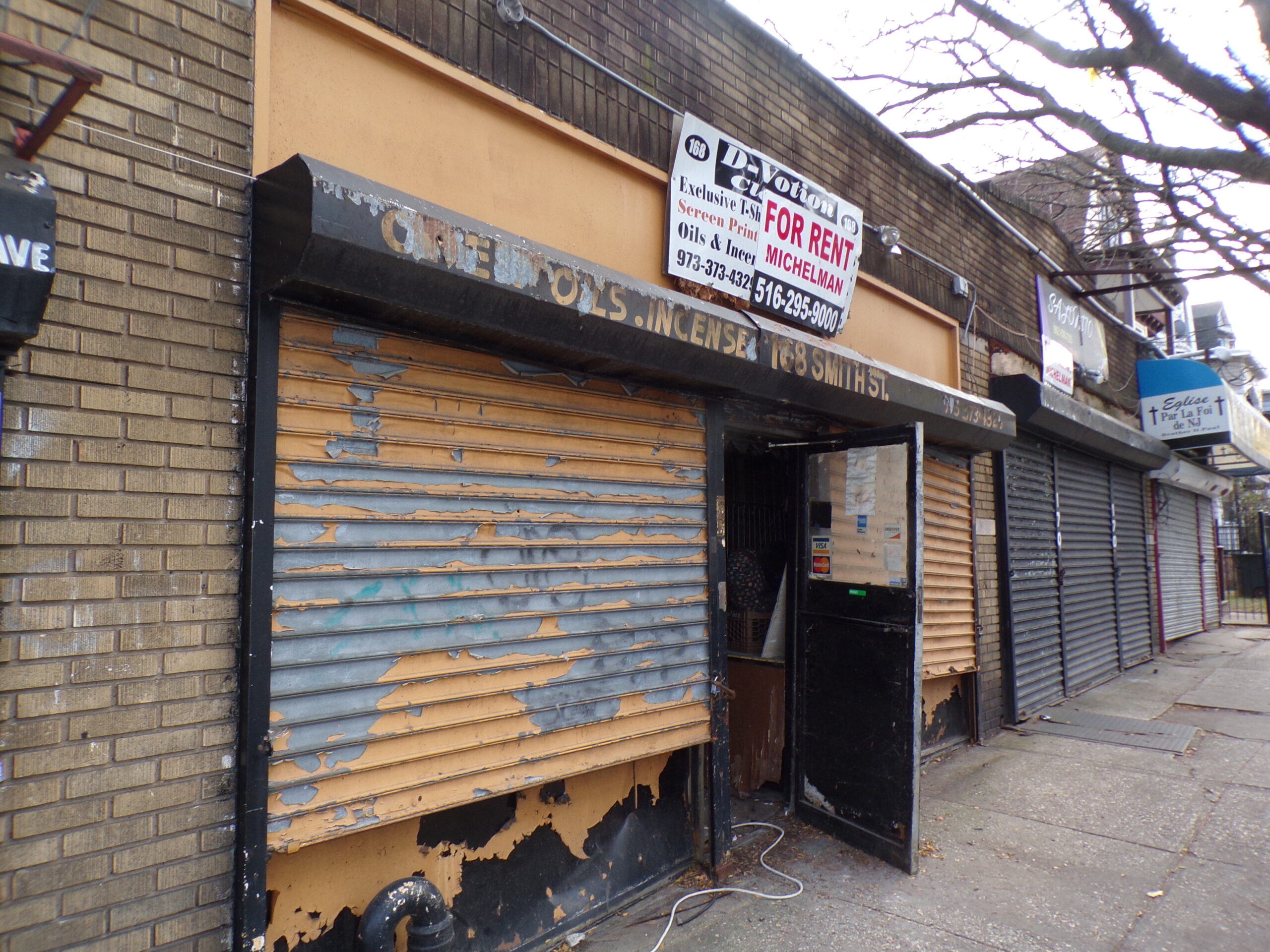
WHITE FLIGHT & PREDATOR POLS PLANTATION
The report flagged the role of poverty, racism, systemic municipal corruption, the lack of decent affordable housing, the flight of of good paying manufacturing jobs out of the city. It also highlighted the lack of state aid and the reality that of Newark’s 15,085 acres, 9,139 acres were tax exempt, with a third of that land occupied by the Port Authority of New York and New Jersey.
As a consequence, property tax rates were sky high on Newark’s residential property owners. “Finally, the affluent and middle classes who have left the city often point to high property taxes as their chief reason for moving,” according to the Lilley report. “As these people have departed, they have left behind a city of the poor.”
“Had we, as a society, made a more timely and determined effort to solve them, the events that led to the establishment of this Commission might never have occurred,” the report’s introduction asserted. “Nor can we plead ignorance about the nature of these problems. The shelves of government offices and academic institutions are filled with studies that shed light on them and offer avenues for solutions. The question is whether we have the will to act. The record of history does not augur well for action.”
The panel eluded to the the “unresolved” question of “the place of Negro in American society… that almost tore the nation apart one hundred years ago.”
The Lilley report analysis continued. “Poor housing, unemployment and inferior education of Negroes figure prominently in the report on the 1919 Chicago riot, just as they do in our analysis of the conditions in Newark in 1967. The mood in our cities clearly indicates that commissions like ours will have outlived their usefulness unless action is forthcoming from their recommendations. Our disadvantaged communities must see far more tangible evidence of a commitment to challenge than has emerged so far, or the summer of 1967 is likely to become a prologue to tragedy, and the time for study and planning will have run out.”
More than a half century after the Lilley Report was published, the city still finds itself battling external economic forces that include a form of winner take all capitalism. A week before the first round of the municipal election, a Rutgers University study showed that close to half of all of its homes sold in the last three years were now owned by corporations, “a model designed to enrich investors through returns from rent collections….that can displace residents and ownership,” according to the authors of Who Owns Newark?
“The Rutgers Center on Law, Inequality and Metropolitan Equity (CLiME) found the city has the highest rate of corporate buyers in the nation, although numbers are rising throughout the country,” according to a press release issued with the report. “This is especially true in mostly Black neighborhoods, like Newark’s South and West Wards, where corporate property ownership is most prevalent.”
The Rutgers’ researchers wrote, that while this trend is happening in other cities it is playing out on in Newark “on a scale unmatched anywhere in the country” with more than 47 percent of the city’s one-to-four unit buildings sold to institutional buyers” who were often “completely anonymous investors”, hence the title of the Rutgers’ report, Who Owns Newark? Transferring Wealth from Newark Homeowners to Corporate Buyers.
AMERICAN DREAM LLC “Sadly, this reality continues a long pattern of economic threat to predominantly Black and increasingly Latino neighborhoods in a state whose communities are among the most segregated in the country,” the report states. “From racial exclusion to predatory lending, from foreclosure to the extraction of rents, Newark’s experience demonstrates what can happen when local economies ignore equity.’’
[caption id="attachment_134936" align="alignleft" width="300"]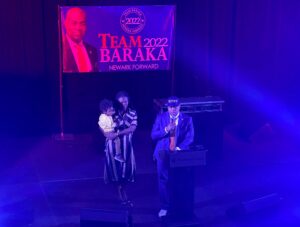 Baraka[/caption]
Baraka[/caption]
The Baraka administration responded quickly to the report with what it described as a “wide-ranging package of proposed measures to mitigate the effects of the purchase of owner-occupied homes by large-scale investors.”
“The COVID-19 pandemic accelerated this decade-long national trend in residential real estate which results in rapidly rising rents, decreased homeownership, reduced availability of affordable housing, renter displacement, and less stable communities,” according to the City Hall press release.
“In cities and even suburbs across America, institutional investors are eroding the American dream of homeownership as they convert owner-occupied homes into corporately owned rental units,” Mayor Baraka said in a statement. “In Newark, where we have worked hard for years to expand homeownership, we will do everything possible to combat this dangerous trend. The CLiME report signals that Newark must create stronger and more equitable laws, regulations, and policies to ensure that residents share in the growth of our city.”
In a radio appearance on 102.9’s Breakfast Club before the election, Baraka said that they city was going to require that entities that buy Newark’s homes in bulk disclose the individuals behind the transactions while helping non-profits to provide more affordable housing and promote family home ownership.
And for the investors who buy up residential properties and jack up the rent, Baraka said the city will levy a surcharge as a disincentive.
“It will mitigate it, but it won’t stop it,” Baraka conceded fatalistically.
It appears that’s a heavy lift that will require waking what Rev. Barber describes as America’s “sleeping giant”.





